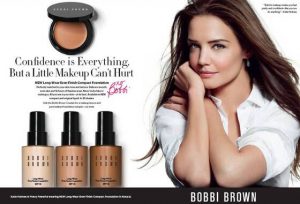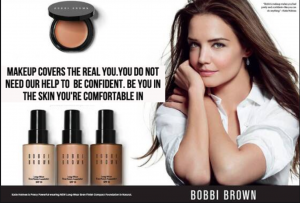GRSJ 300- Culture Jam Assignment

The Issue:
The following advert was published by the makeup company Bobbi Brown in 2013, as a way of promoting the actress Katie Holmes as the new brand ambassador for the company’s products. In this advertisement, Bobbi- Brown is trying to sell foundation to their consumers, primarily working women in the early twenties and late thirties.
The use of this advertisement has highlighted a significant problem in today’s society of gender bias towards women having to comply with the unrealistic beauty standards enforced by social media platforms and marketing. The use of such adverts across multi-media platforms causes many young women to become self-conscious and uncomfortable with the way they look in public. As a result, they are contributing to a large variety of mental health disorders, such as low self-esteem seen in women. The issue which will be addressed by jamming this advertisement will be that women do not need to result in using makeup to feel confident in themselves. The simple motto, of “confidence, is everything, but a little makeup can’t hurt,” used by Bobbi Brown can negatively impact women’s self-esteem, hindering their confidence. As a result, women who feel targeted upon seeing this advertisement would do anything to look like the model with flawless skin, even if that results in the product’s purchasing. The company was careful in stating that a “little makeup can’t hurt”; however, the actress in this advertisement is wearing much more than just a “little makeup,” including mascara, blush, highlighter, and eyeliner which contradicts the statement made. Approximately 74% of women say, models portrayed in such advertisements have a significant influence on the decision-making process of purchasing the product (Stanković, 2018). Many women who idealize Katie Holmes will associate the product quality with the actress’s photo-shopped image. Thus, causing many women to change their appearance to look like the model, who is not showcased as her true self. Overall, this advertisement emphasizes the pressures women face to uphold beauty standards enforced by society, affecting women’s self-esteem and self-confidence, as many young women feel the need to maintain such impractical standards in today’s world.
Jammed Version:

The intended purpose of the jammed advertisement was to evoke an understanding among women who use such products, that makeup does not help women become confident, and that confidence comes from within. I wanted to represent the initial message the brand was trying to portray, that “confidence is everything,” however, for someone to be confident they must be comfortable with themselves. Makeup is often used as a cover-up to hide flaws; women do not want to show to others. Thereby, with this intention, I decided to make this statement that make up covers the real you, implying that women are beautiful as they are, and do not need help from makeup companies such as Bobbi-Brown to help them feel confident. Confidence comes from a healthy mindset, not a mundane property.
The newly improved advertisement tells women that makeup is not needed to make them feel confident and do not follow standards created by society. As long as they are comfortable being who they are, there is no need for them to change. I believe it is the route of the problem to beauty standards and society, that women are supposed to conform to, being a strong woman comes from within. Lastly, the company must want the product to sell; after all, it is an advertisement. Therefore, the last statement, “be you, in the skin you’re comfortable in,” suggests that women should use makeup as a way of self-expression. Furthermore, it tells the audience that they should be comfortable in their skin, affirming that they do not need to conform to the makeup industry’s unrealistic beauty standards. Women who choose to wear makeup are confident in themselves and use makeup as a form of self-expression rather than a reason to change their appearance. Women do not have to conform to society’s idea of beauty but rather their concept of beauty.
Works Cited
Stanković, Jelena & Živković, Radmila & Marić, Tamara & Gajic, Jelena. (2018). Effects of women representation in advertising on customers’ attitudes. Marketing. 49. 192-205. 10.5937/markt1803192S.